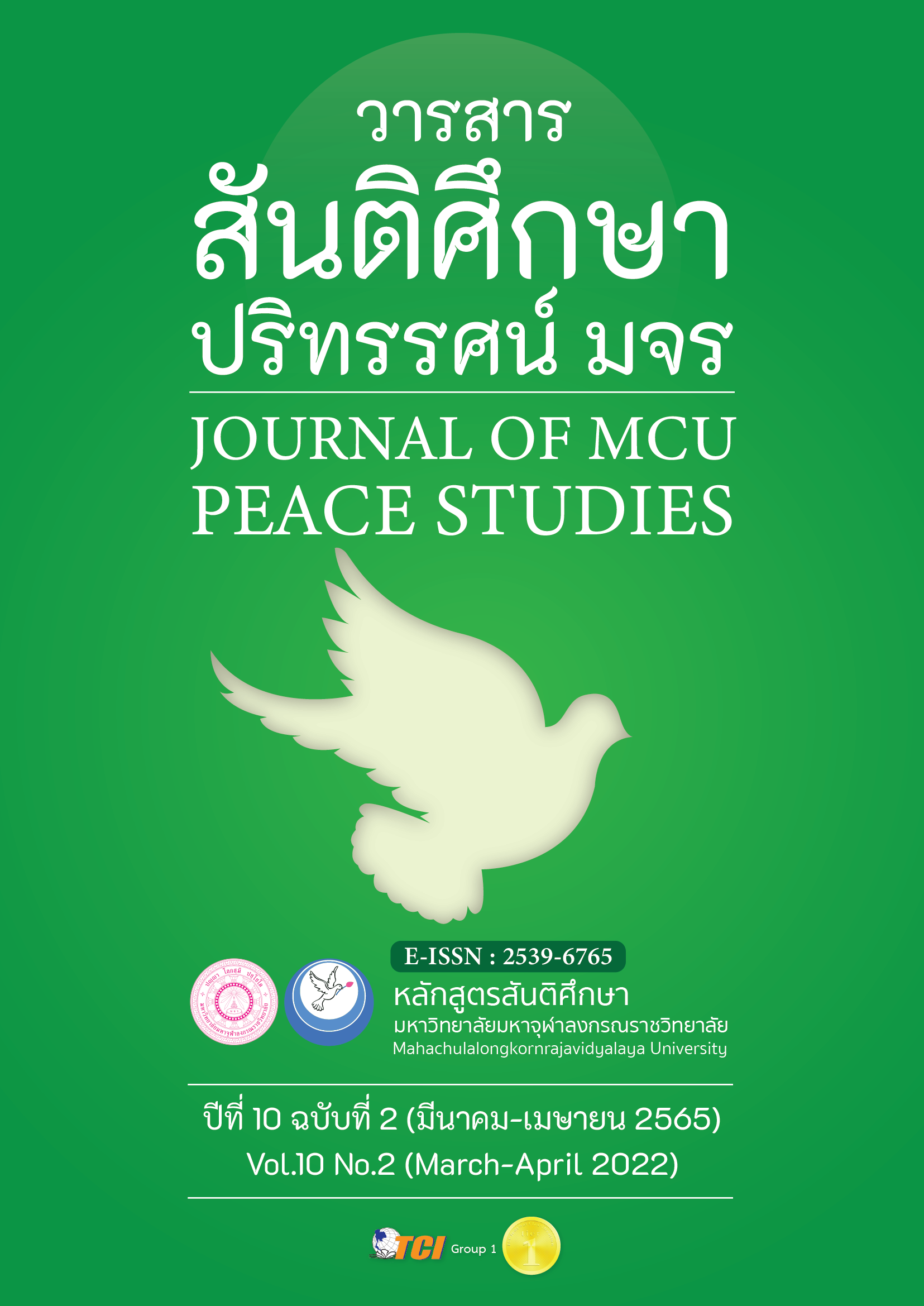รูปแบบการให้คำปรึกษากลุ่มตามแนวสติปัฏฐาน เพื่อสร้างเสริมสุขภาวะทางปัญญาตามหลักพุทธธรรมของผู้ต้องขัง
Main Article Content
บทคัดย่อ
บทความวิจัยนี้มีวัตถุประสงค์เพื่อ 1) เปรียบเทียบคะแนนสุขภาวะทางปัญญาตามหลักพุทธธรรมของผู้ต้องขังภายหลังเข้าร่วมใช้รูปแบบการให้คำปรึกษากลุ่มตามแนวสติปัฏฐาน 2)เปรียบเทียบคะแนนสุขภาวะทางปัญญาตามหลักพุทธธรรมของผู้ต้องขังระหว่างกลุ่มทดลองและกลุ่มควบคุม กลุ่มตัวอย่าง ได้แก่ ผู้ต้องขังคดียาเสพติด(ยาบ้า)ในฐานะผู้เสพ ผู้ค้าเป็นทั้งผู้เสพและผู้ค้า จำนวน 16 คน ซึ่งถูกศาลพิพากษาตัดสินจำคุกตั้งแต่ 1 ปีขึ้นไปแต่ไม่เกิน 10 ปี ภายในเรือนจำกลางกำแพงเพชร ปี พ.ศ. 2563 ที่มีคะแนนสุขภาวะทางปัญญาต่ำกว่าเปอร์เซ็นต์ไทล์ที่ 25 ลงมาตามเกณฑ์การคัดเลือกเข้าและมีความสมัครใจเข้าร่วมพร้อมลงนามยินยอมตามหลักจริยธรรมการวิจัยในมนุษย์ ดำเนินการสุ่มอย่างง่ายเพื่อแบ่งเป็นกลุ่มทดลองและกลุ่มควบคุม กลุ่มละ 8 คน เครื่องมือที่ใช้ ได้แก่ แบบวัดสุขภาวะทางปัญญาตามหลักพุทธธรรมของผู้ต้องขังและรูปแบบการให้คำปรึกษากลุ่มตามแนวสติปัฏฐาน สถิติที่ใช้ ได้แก่ ค่าเฉลี่ย ค่าเบี่ยงเบนมาตรฐาน t-test for dependent และ t-test for independent
ผลการวิจัยพบว่า 1) ภายหลังเข้าร่วมใช้รูปแบบการให้คำปรึกษากลุ่มตามแนวสติปัฏฐาน ผู้ต้องขังกลุ่มทดลองมีคะแนนสุขภาวะทางปัญญาตามหลักพุทธธรรมโดยรวมเพิ่มขึ้นอย่างมีนัยสำคัญทางสถิติที่ระดับ .05 2) ภายหลังการทดลอง ผู้ต้องขังกลุ่มทดลองและกลุ่มควบคุมมีคะแนนสุขภาวะทางปัญญาตามหลักพุทธธรรมโดยรวมแตกต่างกันอย่างไม่มีนัยสำคัญทางสถิติ
Article Details

อนุญาตภายใต้เงื่อนไข Creative Commons Attribution-NonCommercial-NoDerivatives 4.0 International License.
ทัศนะและความคิดเห็นที่ปรากฏในบทความในวารสาร ถือเป็นความรับผิดชอบของผู้เขียนบทความนั้น และไม่ถือเป็นทัศนะและความรับผิดชอบของกองบรรณาธิการ ยินยอมว่าบทความเป็นลิขสิทธิ์ของวารสาร
เอกสารอ้างอิง
of Prisoners in Bang Kwang Central Prison, Nonthaburi Province. Journal of Police Nurses, 9(1), 117-127.
Centre for Health Equity Monitoring Foundation. (2019). Project of the Policy Presentation of
Fragile Population Health Right: National Health Commission Office. Retrieved July 13, 2021, from https://kbphpp.nationalhealth.or.th/bitstream/handle/123456789/21666/FragileGroup2019.pdf?sequence=1&isAllowed=y
Chai-ead, C. (2015). The well-Being of Members of Songkhla Sajja One-Bath-Pledge Saving
per Day Network for the People’s Welfare Sactor. (Master’s Thesis). Prince of Songkhla University.
Corey, G. (2015). Theory and Practice of Counseling and Psychotherapy. (10th Ed.).
Boston USA: Cengage learning.
Department of Corrections Ministry of Justice. (2017). Behind the wall : look at Thai jail after
Coup d’etat. Bangkok : department of correction.
Gladding, S. T. (2009). Counseling A Comprehensive Profession. (6th Ed.). Dorling
Kindersley(India): Licensees of Pearson Education in South Asia.
Himelstein, S., Hastings, A., Shapiro, S., & Heery, M. (2012). A qualitative investigation of the
experience of a mindfulness‐based intervention with incarcerated adolescents. Child and Adolescent Mental Health, 17(4), 231-237.
Jayasundara, M. W. (2012). Rehabilitation of Prisoners through Vipassana meditation.
Department of Sociology and Anthropology, University of Sri Jayewardenepura.
Jiratthikan, S. (2011). Acting in Dhamma Principles of Prisonners in Klongprem Central Prison.
Department of Social Science of Mahachulalongkorn University.
Kabat-Zinn, J. (1990). Full catastrophe living: The program of the stress reduction clinic at the
University of Massachusetts Medical Center.
Kittiporn, T. (1992). Group Counseling. Department of Guidance and Educational Psychology,
Educational Faculty of Naresuan University.
Komonhirun, N., Phrasutthirattanabundit, & Srithong, K. (2020). The cognitive
Transformation Therapy : Innovation of Prisoners’ Sustainable Mental Development. Journal of MCU Nakhondhat, 7(8), 411-426.
Linphoo, M. (2020). Model of Group Counseling Based on Satipatthan in Promoting the
Prisoners’ Buddhist Intellectual Well-Being. (Doctoral Dissertation). Behavioral Science Research Institute of Srinakharinwirot University.
Mahatthanadull, S.,& Mahatthanadull, S. (2019). Holistic Well-Beings Promotion for Balanced
Way of Life according to Buddhist Psychology. Journal of MCU Nakhondhat, 6(3), 1161-1172.
McGahee, P. W. (2015). Mindfulness Meditation: A Practical Intervention in addressing stress
and anxiety in inmates. State University of New York: The College at Brockport.
Mungpanich, A. & Kudkung, K. (2020). Effect of mindfulness-based therapy and counseling
group on suicidal risk of prisoners. Journal of Mental Health of Thailand, 28(3),
240-51.
National Health Act. (2007). Royal Thai Government Gazette (Book 124 Episode 16 A.,
Page 1).
Phra Brahmagunabhorn (P.A.Payutto). (2009). BudhhaDhamma(Extended Edition). Bangkok:
Printing House of Mahachulalongkorn University.
Prajead, S. (2007). Thai Prisoners’ Mental Health and Defense Mechanism. Justice
Magazine, 7(4), 51.
Ronel, N., Frid, N., & Timor, U. (2013). The practice of positive criminology: A Vipassana
course in prison. International Journal of Offender Therapy and Comparative Criminology, 57(2), 133-153.
Suriyawong, W. (2015). Academic seminar conclusion: Diversion of Cases and Offenders.
Retrieved August 3, 2021, from https://www.parliament.go.th/ewtadmin/ewt/parliament_parcy/download/article/article_20200608145458.pdf
Tanakornnuwat, S., Iamsupasit, S., & Srikhruedong, S. (2019). Journal of MCU Humanities
Review, 5(2), 201-212.
Tatsanachaiyasakul, N. (2005). Criminality Prevention: Protection(2). Nonthaburi:
Pronpimkanpim.
Thai Health Promotion Foundation. (2013). Tools of Wisdom : Lesson Learned in Working
With Youths in Working Dimensions of Promoting the Intellectual Well-Being in Volunteer Camp, Drama and Music(1). Bangkok: Parbpim.
Wongpiromsarn, Y. (2017). Mindfulness in Organization(4). Consultation Group of Mental
health of Ministry of Public Health. Bangkok: Beyond Publishing.


